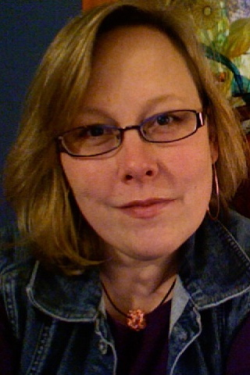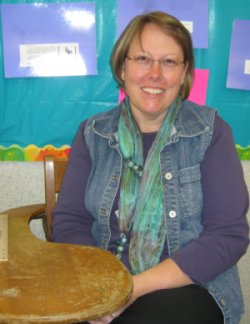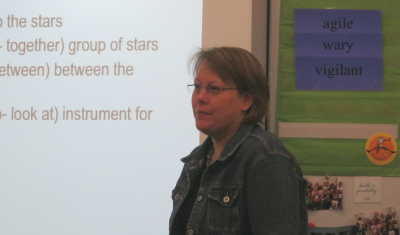NeWP Profile–Diana Weis

Core Academy 5th Grade Teacher
Cather Elementary School, Omaha
- The Nebraska Writing Project Creates Community and Opens Converstions
- NeWP Sponsors Powerful Conversations in the Teaching Community
- NeWP Devleops Converstion about Writing in the Classroom


Background:
- 18 years of teaching experience and has been a Core Academy 5th Grade Teacher at Cather Elementary since 2004
- Served as an Instructor at the College of St. Mary from 2006-2010
- Earned her Master of Arts from the University of Nebraska-Lincoln in 2003
- Taught as an English Language Learner Teacher (K-12) at Millard South from 1997 to 2003
- Served as an English as a Second Language Teacher at Morton Elementary from 1994 to 1996
- Earned her Bachelor of Arts from the University of Nebraska-Kearney in 1994

Professional Contributions and Accomplishments:
- Nebraska Writing Project Mini-Grant Recipient, 2009 & 2010
- Creative Communications Language Arts Grant Recipient, 2009
- Qwest Foundation Technology Innovation Grant Recipient, 2008
- Peter Kiewit Teaching Award for Excellence in Classroom Teaching, 1999
Involvement with NeWP:
- NeWP Tech Liaison, 2011-present
- Summer Writing Institute Co-facilitator, 2010 & 2011
- NeWP Web Manager, 2009-2011
- Technology Institute Co-facilitator, 2009
- NeWP Advisory Board, 2008-present

The Writing Project Creates Community and Opens Conversations:
- “You don’t feel alone,” Diana says. The NeWP provides a location in which “there’s such a powerful discussion on writing. It’s an organic discussion and it’s different every year, but everyone comes to the conclusion that it’s communicative and not prescriptive. To have those kinds of discussions with your peers and know that they are out there helps quite a bit.” There is a value in having individuals there that have been through similar things and had similar conversations.
- “The NeWP redirected me to a different discussion about writing,” Diana explains, “In a world where most staff development deals with the questions how and when, the Nebraska Writing Project brought me to the question ‘why’—behind both the teaching and writing process I have appreciated that discussion as it speaks directly to the part of writing that hooks us (teacher, student) into writing. I love being part of that discussion and consider it a gift.”
- The NeWP becomes a place of community and friendship for those involved. “My last vacation was a Writing Project event” Diana explains, “Actually, my last three vacations were all linked up with the Nebraska Writing Project somehow.”


The Writing Project Sponsors Powerful Conversations in the Teaching Community:
- Everyone at the NeWP is there as a teacher or as a professional, Diana explains, “I have never met anyone in the Writing Project who wasn’t one of those teachers you either wanted to have or wanted your kids to have.”
- The writing that goes on during the WP among that group of individuals is “all personal writing, whether it be for an academic piece or something you’re passionate about” she says, and through sharing that writing “you learn the person’s passion as a human that connects you and then you have the discussions as a professional.”
- As teachers, there’s a moment of realization that “it doesn’t matter what grade level, it’s the process that’s the same.” Even though there are differences in specific professional careers “we’re basically all teaching the same thing, just a little differently."
- When the Writing Project is finished, participants have a binder containing lessons. “If I ever need something I can open it up and adapt a lesson.”
- Her involvement in the NeWP made Diana “comfortable talking about writing.” It can be scary, “writing is completely internal, sometimes you don’t even see the person’s reaction when they read it,” she explains, but “the comfort of knowing how I write helps.”



The Writing Project Develops Conversations about Writing in the Classroom:
- Diana believes in the importance of allowing the students to tell what they need to tell. “What I think is masterful about teaching writing is allowing the kids to do it and getting out of their way.”
- Diana’s passion for talking about writing comes through on her student’s papers; “when you have 50 students you can’t individually speak to each one so I write notes all over the place” ‘I like this,’ ‘This sounds good.’ When they get their papers back they’ve never seen that much marking.” “You weren’t there when I read your paper,” she tells them, “so I had to talk to you with my pen.”
- “One of the most successful things with writing is allowing the students to learn from the writing of other students” Diana explains. She works with her program so that students are able to learn in this way.
- “Students like seeing me write with them. They like seeing pieces I’ve written because it makes writing real.” Diana shares her writing process with her students. She explains, “what I struggle with in writing and how I figured out what I need to do to change my writing” means she can help them discover their own writing pieces. “They definitely like when I share with them. It shows them that it’s a continual process and they enjoy that.”
- Diana’s experience has also helped test scores for her school. She worked with the 4th grade teacher when “they were gearing towards the narrative state assessment.” “The 4th grade scores went up that year,” and Diana attributes part of the success to having a conversation about writing.
- Those conversations help Diana as well, “my scores have gone up every year that I have been involved in the writing project” she says, “Last year all my students passed.” Even with such an incredible achievement, there is always room for improvement and Diana continues to look to the next task: “my next goal is to show them [her students] a way to communicate so they are even higher up.”

